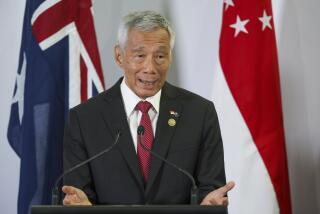Taiwan’s President Elected Ruling Party Leader
TAIPEI, Taiwan — President Lee Teng-hui was elected chairman of the ruling Nationalist Party on Friday, marking the ascendancy of reform-minded technocrats and the close of an era in which the family of Chiang Kai-shek dominated Taiwan’s politics.
In a rare public appearance, Chiang’s widow, Soong May-ling, who exercised great power as Chiang’s confidante, aide and translator when he ruled China from 1928 to 1949, greeted delegates gathered for the ruling party’s 13th National Congress and offered a low-key endorsement of Lee.
Soong, believed to be 90 or 91 years old, is still highly influential with elderly party conservatives who fled to Taiwan in 1949 after the Communists took power in China.
When Taiwan-born Lee, 65, who had been vice president, succeeded to the presidency in January upon the death of Chiang’s son, Chiang Ching-kuo, Soong led an unsuccessful effort to block him from becoming acting party chairman.
In her speech Friday, which a party official read to delegates after Soong personally greeted them, she declared: “I wish that our party, under the leadership of its chairman, will be united to continue enhancing its glorious history.”
Chiang Ching-kuo’s younger brother, Gen. Chiang Wei-kuo, 71, secretary general of Taiwan’s National Security Council, continues to wield considerable influence in the government and military, and several of the late president’s sons may win election to high party bodies at the congress. However, the family’s dominance is widely seen as having come to an end.
The major controversy at Friday’s session was prompted not by elderly conservatives or members of the Chiang family but by leaders of the most liberal wing of the party. They demanded that, as a step toward greater intra-party democracy, the party chairman be elected by secret ballot rather than by the traditional method of having delegates stand.
Legislator Chao Shao-kang, in a fiery speech to delegates, argued vehemently that the party must introduce more democratic internal procedures. Speaking with reporters later, Chao said this is necessary for the party to maintain its popularity in the face of competition with the opposition Democratic Progressive Party.
Nevertheless, the vote was conducted by the traditional method. Of the 1,184 delegates present, 1,176 rose to vote for Lee as chairman; Chao and seven allies remained seated to protest the procedure.
In Beijing, the official New China News Agency reported that Communist Party General Secretary Zhao Ziyang sent a congratulatory cable to Lee.
Lee and other Nationalist Party leaders have strongly rejected any possibility of reunification with the mainland so long as Communist rule continues. However, the party is taking steps toward a more relaxed policy on non-official contacts with the mainland.
More to Read
Sign up for Essential California
The most important California stories and recommendations in your inbox every morning.
You may occasionally receive promotional content from the Los Angeles Times.










